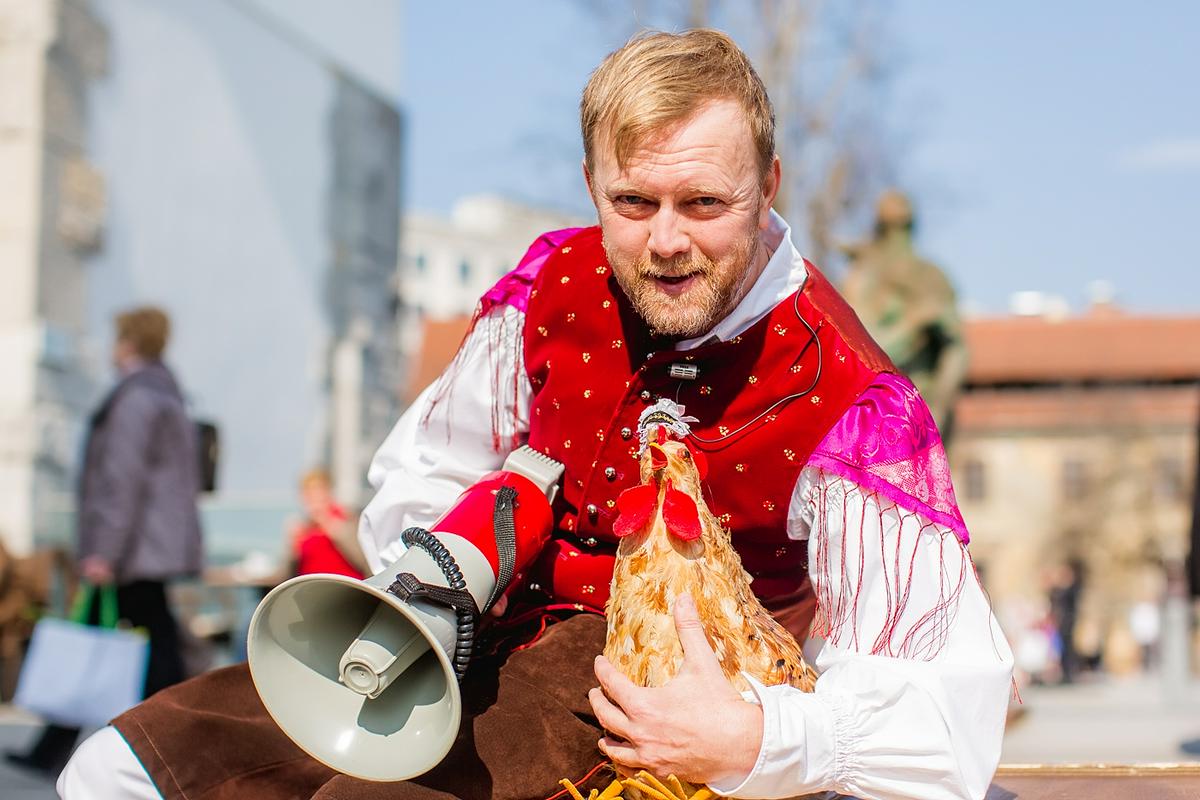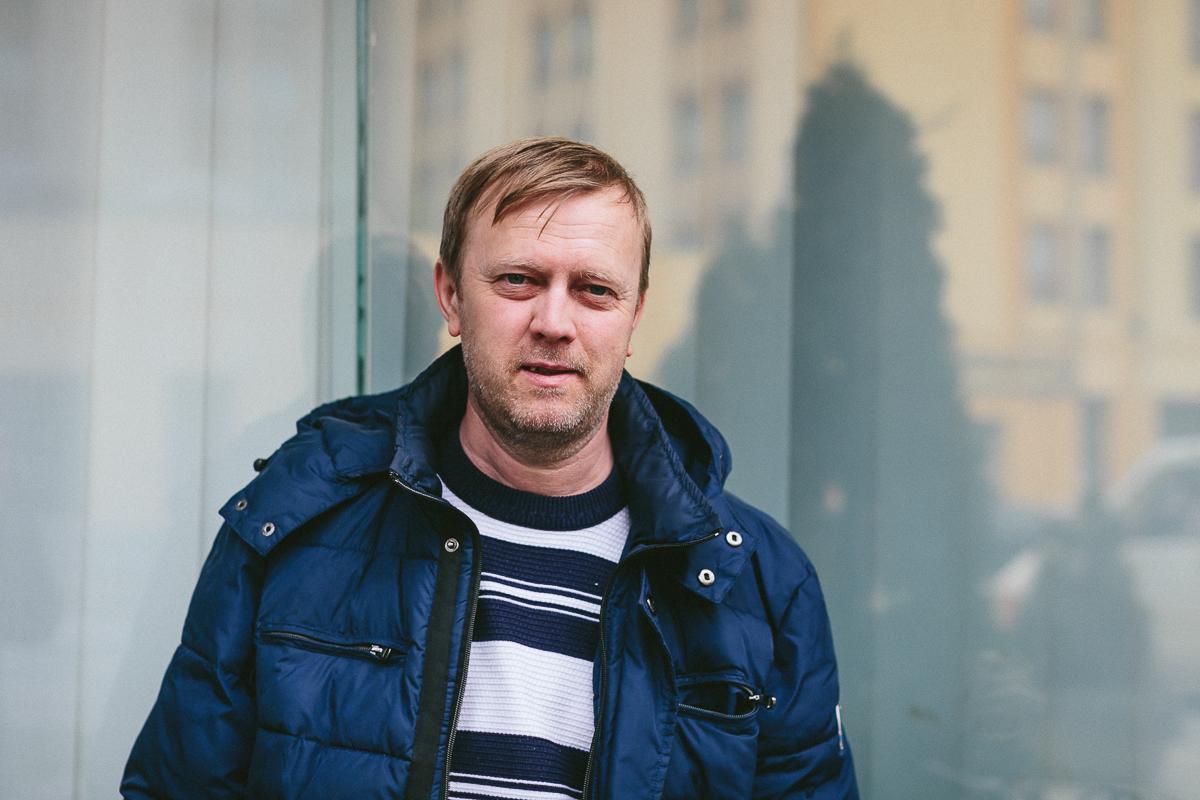

He remains an optimist. He was only pessimistic about the Keber law, fearing for all the unemployed – what should they do with themselves until ten a.m.? Now Matjaž Javšnik has placed a mirror for Slovenians, reflecting their image.
Most people still remember him as Izi from the TV show Dober dan, or a college drop-out from V leru, or as Tinček from Zadnja večerja. Yet Javšnik doesn't let himself be framed. He claims he is cramming for everything.
Recently the premiere of your new solo comedy Striptease took place, by which, you say, you placed a mirror for Slovenians, reflecting their image. How would you describe an average Slovenian?
An average Slovenian is a mutated bee. He need not be hard-working any more. But he still likes to graze on fields owned by others. He likes the Austrian facades, i.e. pastel shades similar to those used on beehive panels. He likes to have a brand new car in front of his house, even when it takes next four generations to pay the loan he took to pay for it. Because a Slovenian doesn't care much if he has a screw loose in his head, as long as all the screws on his car are tight. I think we are just the same as any average inhabitant of our continent. We don't stand out from the average, except because of some details which make us very special.
You claim we don't stand out in anything as a nation, but what about individuals, like for example Tina Maze?
Tina and those like her are a proof that we Slovenians are a proud and enduring nation. Not only athletes, also artists and scientists coming from an environment which practically does not invest into development, conditions for training, work, technical and expert support, if compared to the developed countries we like so much, show why Slovenians as a nation haven't become extinct yet. Because we have individuals who protrude from the average level! But it is also true that the competition, speaking long-term, has nothing to worry about, as we will take care of those who dared to lever themselves above us by ourselves, and bring them down.
The show speaks about you, in the first person singular. How much more difficult it is when you place yourself into the role of the attacked?
Obviously, it is more difficult for you, but funnier for the audience. They don't feel threatened.
Why do we always prefer to laugh at somebody else, and not at ourselves?
Because we are more papal than the Pope. We are incredibly strict toward ourselves, and we think the world of ourselves, even though that is very confusing for a person coming from another continent.
The show Striptease includes elements of a stand-up comedy. Bojan Emeršič recently said in an interview that stand-up is like rap. "Anybody can learn, but the question is how good he is when doing it. It's like a template, you chose a topic, add something stupid and then turn it around. It's like a joke." Do you agree?
No, I disagree. Stand-up is a very specific theatrical form. Well, it is true that 95 percent of the Slovenian stand-up comedians have not grasped it yet – in this I agree. Stand-up as a form is very accomplished, and very exact. In Slovenia I like perhaps three stand-up comedians, because I can find no form, and even less contents. My show is not a stand-up, but a solo comedy. In certain elements it does flirt with a stand-up comedy.
What kind of stand-up comedians you like? What makes you laugh?
Children and their directness, linguistic slips, everyday misunderstandings, and titles printed in bold type in tabloid press.
Are you an optimist, or a pessimist?
I have always been an optimist. The only moment I turned pessimistic was at the introduction of the Keber law, prohibiting serving alcohol before 10 a.m., as I was very worried about all the unemployed in Slovenia – what should they do with themselves before ten?
Now the number of unemployed has increased.
Yes, and without that law everything would function normally.
But you remain an optimist?
By all means. Nothing is ever as bad as it seems, and no problem is so big that it can't be solved.
What takes most of your spare time?
My family (laughter). What else. That's how it is when you have two children. The life is full, and there are so many different activities that no time is left for anything else.
How much have the children changed your daily routine, and what have you learned from them? I must mention Emeršič again, who is just presenting his solo comedy Mulc (The Kid), in which he included his son’s perspective on the world.
You learn everything. Also tollerance, and a different view on the world. You learn anew about life, as if you learned again to walk, talk, go to school… The funny thing is that we don't raise children, but, if we are smart enough, they raise us. They are so clean, they have such an innocent view on the world, on the way people function. You learn the most from them.
Which are the unpleasant topics Slovenians like to avoid?
Those are still religion, social distress – it is unpleasant to us to talk about that – and politics. We are still divided. I have never been neither left- nor right-winger, so when somebody worries for a second because of something I say, the next minute he starts laughing, because I show mercy to neither.

































































